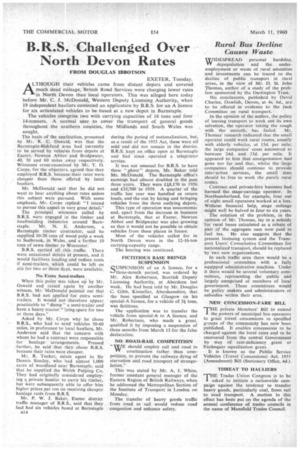B.R.S. Challenged Over North Devon Rates
Page 48

If you've noticed an error in this article please click here to report it so we can fix it.
FROM DOUGLAS IBBOTSON EXETER, Tuesday.
ALTHOUGH their vehicles came from distant depots and covered much dead mileage, British Road Services were charging lower rates in North Devon than local operators. This was alleged here today before Mr. C. J. McDonald, Western Deputy Licensing Authority, when 19 independent hauliers contested an application by B.R.S. for an A licence for six articulated vehicles to be based at a new depot in Barnstaple.
The vehicles comprise two with carrying capacities of 16 tons and four 14-tanners. A normal user to cover the transport of general goods throughout the southern counties, the Midlands and South Wales was sought.
The basis of the application, presented
by . Mr. R. C. Oswald, was that the Barnstaple-Bideford area had currently to be served by vehicles from depots at Exeter, Newton Abbot and Bridgwater, 40, 50 and 60 miles away respectively. Witnesses cross-examined by Mr. T. D. Corpe, for the objectors, agreed that they employed B.R.S. because their rates were cheaper than those offered by local hauliers.
Mr. McDonald said that he did not want to hear anything about rates unless this subject were pursued. With some emphasis, Mr. Corpe replied: "I intend to pursue this aspect in very great detail."
The principal witnesses called by B.R.S. were engaged in the timber and boatbuilding industries around Barnstaple. Mr. N. E. Anderson, a Barnstaple timber contractor, . said he supplied 10-20 tons of wood pulp a week to Sudbrook, in Wales, and a further 10 tons of sawn timber to Worcester: B.R.S. carried all this traffic. There were occasional delays at present, and it would facilitate loading and reduce costs if semi-trailers, which could be left on site for two or three days, were available.
No Extra Semi-trailers
When this point was taken up by Mr. Oswald and raised again by another witness, Mr. McDonald pointed out that B.R.S. had not applied for extra semitrailers. It would not therefore appear practicable to " dump " a semi-trailer and have a heavy tractor "lying spare for two or three days."
Asked by Mr. Corpe why he chose B.R.S., who had to send vehicles 50-60 miles, in preference to local hauliers, Mr. Anderson said that the concern with whom he had a contract were responsible for haulage arrangements. Pressed /further, he said that they chose B.R.S. because their rates were cheaper.
Mr. R. Tucker, estate agent to Sir Dennis Stucley, who had almost 1,000 acres of woodland near Barnstaple, said that he supplied the Welsh Pulping Co. They had originally considered employing a private haulier to carry his timber, but Were subsequently able to offer him higher prices per ton on receiving cheaper haulage rates from B.R.S.
Mr. P. W. I. Baker, Exeter district traffic manager of B.R.S., said that they had had six vehicles based at Barnstaple
814
during the period of nationalization, but, as a result of the 1953 Act, these were all sold and did not remain in the district. B.R.S. kept an office open at Barnstaple and had since operated a teleprinter service.
It was not unusual for B.R.S. to have these " ghost " depots, Mr. Baker told Mr. McDonald. The Barnstaple office's earnings had almost doubled in the past three years. They were £1..8,170 in 1956 and £35,700 in 1959. A quarter of the traffic last year was handled as return loads, and the rest by hiring and bringing vehicles from the three outlying depots.
This type of operation was uneconomic and, apart from the increase in business at Barnstaple, that at Exeter, Newton Abbot and Bridgwater was also growing so that it would not be possible to obtain vehicles from these places in future.
Most of the vehicles called for in North Devon were in the 12-16-ton carrying-capacity range.
The hearing was continued.
FICTITIOUS BASE BRINGS SUSPENSION
SUSPENSION of an A licence, for a three-month period, was ordered by Mr. Alex Robertson, Scottish Deputy Licensing Authority, at Aberdeen last week. He had been told by Mr. Douglas C. Gibb, Kinnellar, Aberdeenshire, that the base specified as Glasgow on his special-A licence, for a vehicle of 3$ tons, was fictitious.
The application was to transfer the vehicle from special-A to A licence, and Mr. Robertson, who made a grant, qualified it by imposing a suspension of three months from March 13 for the false declaration.
NO ROAD-RAIL COMPETITION
" WE should employ rail and road in combination rather than competition, to prevent the railways dying of starvation and road transport of strangulation."
This was stated by Mr. A. J. White, former assistant general manager of the Eastern Region of British Railways, when he addressed the Metropolitan Section of the institute of Transport in London on Monday.
The transfer of heavy goods traffic from road to rail would reduce road congestion and enhance safety.




































































































































